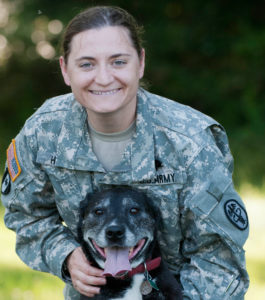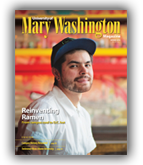
With a biology degree from Mary Washington
and an unshakable affection for animals, Maj. Karyn Havas headed to veterinary school at Cornell University. Today she teaches troops about diseases that affect animals and humans.
As a child, Karyn Havas ’01 wanted to help sick animals the way some kids long to fight fires or put away bad guys. She thought veterinary medicine meant spending days with cuddly creatures like her pet guinea pig − not the study of diseases like brucellosis or Rift Valley fever.
Havas got a job at a dairy farm while in high school in Pennsylvania. There was nothing cuddly about it, and she loved it. After graduation, she chose to study biology at the University of Mary Washington and spent summers and breaks working on a horse farm and in an animal hospital. Those educational and work experiences, Havas said, solidified her desire to become a veterinarian.
Havas set goals and made plans. “I always have a plan,” she said with a laugh. After graduating from UMW, she completed Cornell Veterinary School on an Army scholarship. In 2011, she earned a Ph.D. in veterinary epidemiology from Colorado State University. Today she is a major in the Army, putting her skills and education to work at the service’s Public Health Command in Aberdeen, Md.
Havas helps educate troops and the public on diseases that can infect both animals and humans, such as West Nile virus, Ebola, and swine and avian flus. She served in Iraq in 2007, tending to service animals. In 2008, she helped devise an official training program for new Army veterinarians. For her dissertation, she spent 2½ months in the Republic of Georgia researching brucellosis, a bacterial illness humans contract by consuming unpasteurized milk from infected animals.
When a soldier died from rabies in 2011 after being bitten by a feral dog in Afghanistan, Havas was part of a sweeping campaign to educate service members about the dangers of stray animals, particularly in war zones.
When Havas contemplates her accomplishments, she thinks of Mary Washington and her role as a resident assistant. Natalie Ellis, a former assistant director of residence life, taught her how to be a good leader − to care for people and hold them accountable.
Associate Professor Dawn Bowen taught a geography class that emphasized cultural sensitivity, a lesson Havas has carried with her around the world. From Professor of Biology Rosemary Barra, she learned balance. “She challenged me academically. When I wasn’t up to par, she’d say, ‘What are you doing? You can do better than that,’ ” Havas said.
Havas remembers having second thoughts about vet school when her first loan notice arrived. Barra talked her through it.
“The thing that made the biggest difference was my relationship with professors,” Havas said. “Those relationships don’t happen at every university.”
